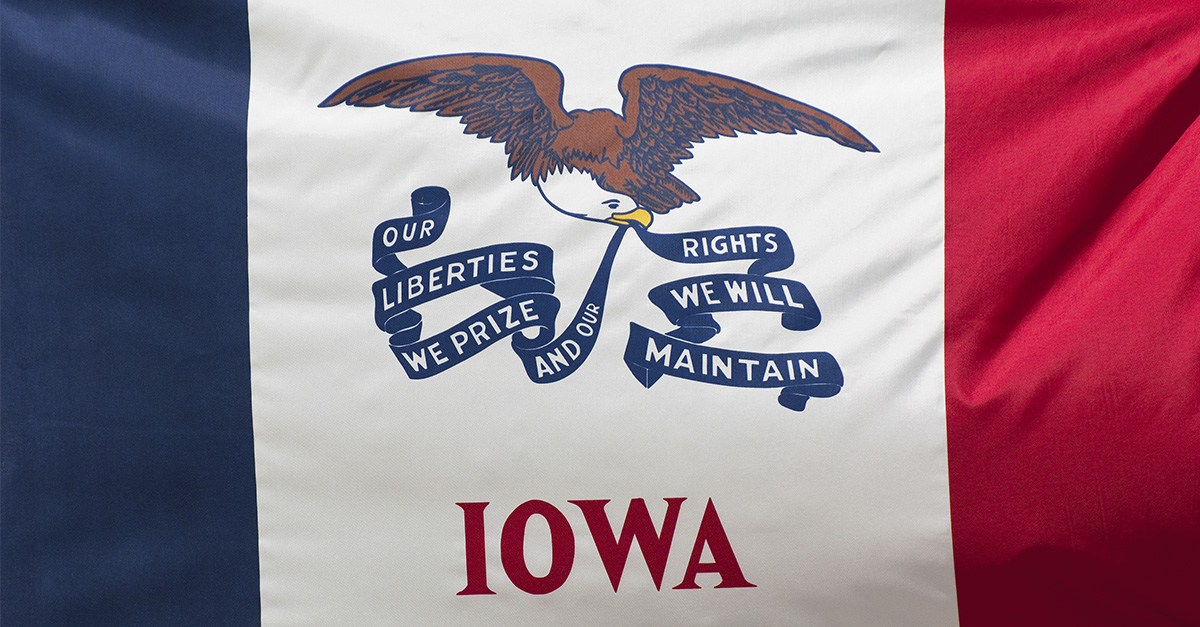


Get a free copy of Parental Rights & Education when you subscribe to our newsletter!

It’s sad that states have to take extra legislative steps to protect the rights of Americans who want to live out their faith, but laws like Iowa’s help America honor its promise that the free exercise of religion will not be prohibited.
On Tuesday, Iowa Gov. Kim Reynolds, R, signed a state Religious Freedom Restoration Act (RFRA), making it the 27th state to do so.
“Thirty years ago, the Religious Freedom Restoration Act passed almost unanimously at the federal level. Since then, religious rights have increasingly come under attack. Today, Iowa enacts a law to protect these unalienable rights — just as 26 other states have done — upholding the ideals that are the very foundation of our country,” the Governor said in a press release.
Reynolds signed the law at a private signing held by the Christian group The FAMiLY Leader. At the Family Champions Dinner the group gave awards to some who helped get the RFRA passed. They also honored Betty Odgaard, who along with her husband ran a business out of a church building that was sometimes used as a wedding venue.
According to The FAMiLY Leader, the couple was sued by the State of Iowa in 2013 for their refusal to participate in homosexual weddings and the state placed a lien on their business and home, driving them out business.
The FAMiLY Leader said that the RFRA gives people who similarly stand up for their beliefs the opportunity to defend themselves in court.
The new law aims to “restore the compelling governmental interest test and to guarantee its application in all cases where the free exercise of religion is substantially burdened by state action.”
It defines the “exercise of religion” as “the practice or observance of religion,” which “includes but is not limited to the ability to act or refuse to act in a manner substantially motivated by one’s sincerely held religious belief, whether or not the exercise is compulsory or central to a larger system of religious belief.”
Under the test, the state may not substantially burden a person’s right to the free exercise of religion even if the law is one which is generally applicable to all citizens unless the state demonstrates that the law furthers a compelling state interest and the law is the least restrictive means of doing so.
Critics of the law claim that it sanctions discrimination against LGBT people.
By contrast, supporters of the law argue that it doesn’t determine who will win a religious freedom case, but only ensures that a person filing a complaint can at least get a hearing.
Greg Chafuen, legal counsel for Alliance Defending Freedom’s Center for Legislative Advocacy, said this RFRA law is necessary in today’s environment to protect Iowans, explaining,
“Americans should be able to defend their rights when their government stops them from living and worshiping according to their faith. This law provides a sensible balancing test for courts to use when reviewing government policies that infringe upon the religious freedom rights of Iowans. The law doesn’t determine who will win every disagreement, but it does ensure that every Iowan—regardless of their religious creed or political power—receives a fair hearing when government action forces a person to violate his or her religious beliefs.”

There are many politicians, activists, and social media users who are lamenting over this law and claiming that it promotes discrimination. They claim it allows hospitals and businesses to refuse to serve LGBT people. Their comments are dishonest and an attempt to conflate disagreement with hatred.
Allow us to translate those arguments for you. What the people complaining about this law actually believe is that every cake baker, like Jack Phillips, should be forced to make a cake celebrating a gay wedding or celebrating gender transitions.
They believe that every florist should have to make floral arrangements for an event no matter if the event goes against their convictions.
They believe that wedding venues should be required to host homosexual weddings.
They believe that every artist should be forced to create messages that violate their religious beliefs simply because someone demands it.
They believe that religious hospitals or religious doctors should not be allowed to refuse to perform transgender surgeries or abortions.
They believe that every doctor and every nurse should face the choice between either administering puberty blockers and cross-sex hormones, participating in mutilating surgeries on healthy people, and participating in abortions and euthanasia or leaving the medical field.
While they claim that laws such as this one are attempts to remove LGBT people from society, it is, in fact, the LGBT activists who are attempting to push those with differing beliefs out of society.
Under their system, a religious person with views that differ from government-approved secular orthodoxy should be required to either violate their religious beliefs or have their business bankrupted and their careers shut down.
That’s not how America works — not if it’s going to remain a free country. And while it’s sad that Iowa and other states have to take these extra legislative steps, RFRA laws like this one help ensure that the United States continues to honor its promise of religious liberty and freedom of conscience.
If you like this article and other content that helps you apply a biblical worldview to today’s politics and culture, consider making a small donation here.
